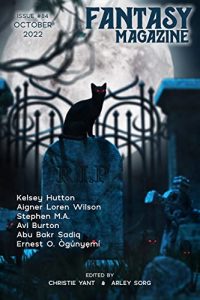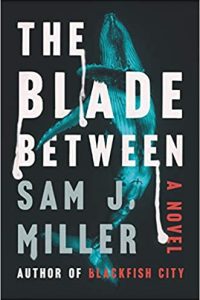Charles Payseur Reviews Short Fiction: GigaNotoSaurus, Fantasy, and Lightspeed
 GigaNotoSaurus 9/22
GigaNotoSaurus 9/22
Fantasy 10/22
Lightspeed 10/22
GigaNotoSaurus featured a story about magic maps and desperate opera composers in September’s “A Conspiracy of Cartographers” by Barbara A. Barnett. Said desperate opera composer is Guillaume who, after his latest work was panned by critics, seeks a short cut to success with the help of a map that will bring him to his greatest work. It’s a hasty and foolish plan, and one that his best friend, the singer Rosemonde, agrees to accompany him on. What he hopes will be full of luck, though, turns out to be a series of disasters, and as he learns about the world and about art and expression a bit more, he also learns that there really are no shortcuts to success – just a lot of work, a bit of growing up, and a lot of help from his friends. Barnett does a nice job of capturing the drama and angst of the privileged composer, and yet doesn’t make him the villain of his own story. Rather, he’s a student, and he has a lot to learn, mostly in the school of hard knocks.
Moving into October, Fantasy had a very strong issue starting with Stephen M.A.’s “Short Swims from Great Heights”, about a boy who becomes a lawyer working for the rights and justice of fish communities in the face of systemic prejudice and widespread violence. As a human, the narrator is insulated in some ways from the corruption and racism that makes life so difficult for his clients, but only up to a certain point. And casting the oppressed as fish doesn’t diminish the biting commentary M.A. makes on the elasticity of corruption, racism, and hate, and how difficult it is to get justice in a system designed from its founding to deny it to those deemed less than human. Aigner Loren Wilson keeps with themes of injustice and broken systems in “The Black and White”. In it, two sisters who have just lost the man who raised them have to team up to track down their biological father – to pay him back for having passed on to them his hunger and curse. The story never comes right out and says what that hunger makes them, but in many ways that’s hardly important. They’re sisters first, looking for a way forward despite the violence of their existence, the ways they’ve hurt themselves and one another, and the ways their hunger makes them monstrous to others. And their quest, as much as it might be about revenge and punishment, is also a way to reconnect and try to be a little less miserable together. Moving to poetry, Abu Bakr Sadiq provides a beautiful take on werewolves, hair, and self-image in “Wolves’ Heaven”. For the narrator of the poem, werewolf is both an insulting label applied to them and a way of learning to find power and acceptance with their body. It’s not about monstrosity, but rather about finding a way to be whole, light of spirit, and beyond the prejudices of others – and Sadiq does a fantastic job dealing with a complex issue through the lens of speculative poetry.
I’ll close with a look at October’s Lightspeed, where I think my favorite of the stories was “Apolépisi: A De-Scaling” by Suzan Palumbo, in which Raya must face that their partner, Aleda, is transforming, and will soon no longer be a part of their underwater world. The moving from water to land isn’t new in mer-person stories, but Palumbo brings a fresh perspective, pain, and tenderness. Raya’s fear and anguish clash with Aleda’s agency and acceptance, both characters having to come to terms with what’s happening to them, and to each other, in difficult and intimate ways. And the story offers no easy out or magical cure, forcing the characters (and the reader) to confront an unavoidable tragedy with what grace and kindness as can be found in a world infused with the saltwater taste of tears.
Recommended Stories:
“Short Swims From Great Heights”, Stephen M.A. (Fantasy 10/22)
This review and more like it in the November 2022 issue of Locus.
 While you are here, please take a moment to support Locus with a one-time or recurring donation. We rely on reader donations to keep the magazine and site going, and would like to keep the site paywall free, but WE NEED YOUR FINANCIAL SUPPORT to continue quality coverage of the science fiction and fantasy field.
While you are here, please take a moment to support Locus with a one-time or recurring donation. We rely on reader donations to keep the magazine and site going, and would like to keep the site paywall free, but WE NEED YOUR FINANCIAL SUPPORT to continue quality coverage of the science fiction and fantasy field.
©Locus Magazine. Copyrighted material may not be republished without permission of LSFF.







